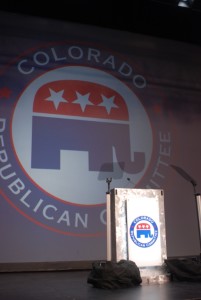Darryl Glenn’s victory in the Republican Senate primary validates some satisfying old political truths in Colorado, such as:
— The caucus system makes it possible for qualified but underfunded candidates to get ahead.
— Political virginity may be advertised as a virtue but voters prefer office-seekers with at least slightly rounded heels.
— Wealthy businessmen with political ambitions who want to start at the top are going to be thwarted.
Glenn was the only one of the five candidates who went through the caucus system. While they were still counting the votes at the GOP state assembly in April, I asked him why he chose that route instead of gathering signatures like the other major hopefuls.
“I never thought about petitioning,” he said. “If you can’t get 30 percent you shouldn’t be running. If you can’t make it at the convention you can’t make it at the grassroots.”
He ended up with 70 percent of the delegate vote, keeping the pre-convention favorite, state Sen. Tim Neville, and a few others off altogether.
I think the standard should be reduced to 20 percent, as it was into the 1980s, if only to encourage more candidates to try the caucuses, but even the lower figure wouldn’t have helped Neville.
Glenn won because he had been traveling the state for months, meeting activists, and he gave a firecracker speech at the convention.
Since primary turnout was relative light (just 36 percent of Colorado’s 998,062 Republicans returned primary ballots), activists who go to caucuses and conventions have disproportionate influence.
Meanwhile, Jack Graham, Jon Keyser, Robert Blaha and Ryan Frazier were circulating petitions — or having paid circulators do it. That led to the revelation of some forged signatures and since all but Graham came up short, according to the secretary of state’s strict standards, they had to rely on forgiving judges to put them on the ballot.
As of the last reporting period in early June, Glenn had spent just $103,000. On the other hand, he did get support from some outside conservative groups.
Glenn captured almost 38 percent of the vote, easily topping second place finisher Jack Graham, who had 24.5 percent. The independently wealthy Graham spent $1 million of his own money on his campaign, much of it going to TV ads.
In a TV ad as well as a radio spot, Graham bragged about how he’s “never run for office,” as though such inexperience was a plus.
That may be true in prostitution but not in politics. What it tells voters is he couldn’t be bothered with serving on boring old city councils, or even four months a year in the legislature. He wants to start at the top.
If you do run for a lower office, stick it out for at least one full term! Keyser, a war hero and an early favorite in the race, was elected to the Colorado House in 2014 but resigned after a single year to prepare for the Senate race. Too much too soon. Perhaps with more political experience he could have handled the petition forgeries that dogged him in May instead of ending up as a joke.
Glenn wasn’t too proud to serve on the Colorado Springs City Council and on the El Paso County Board of County Commissioners. He was elected twice to each job.
Graham suffered from another problem: Although an athlete and later athletic director at Colorado State University, he looked more like a San Francisco Democrat — which in fact he once was.
Establishment Republicans in Colorado historically have recruited wealthy businessmen who can finance their own campaigns for high offices like senator or governor.
But their record is abysmal, going way back. Despite heavy spending, cable pioneer Bill Daniels (1974), developer Phil Winn (1982) and developer Steve Schuck (1986) couldn’t even win the GOP nomination for governor. Crested Butte owner Bo Callaway (1980) and real estate magnate Terry Considine (1986) lost GOP Senate nominations.
Oilman Bruce Benson did win the GOP gubernatorial nomination in 1994 and brewer Pete Coors, its Senate nomination in 2004, but both were wiped out in the general election.
Glenn will be underfunded in the general election against incumbent Democrat Michael Bennet. What’s more, he has the problem of having to bob and weave when asked about presidential candidate Donald Trump’s bizarre positions. And while Bennet promotes himself in TV spots as a negotiator who can cooperate with Republicans on legislation, Glenn, a social as well as economic conservative, says he doesn’t favor working across the aisle.
Still, having a lively personality and a compelling biography, he is likely to do better against Bennet than any of his GOP rivals would have.



